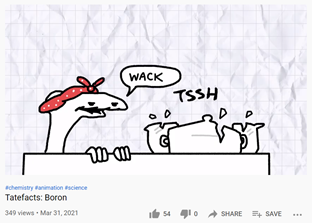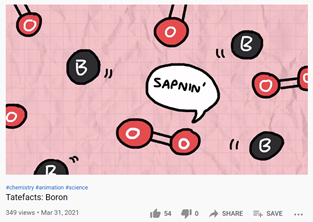Creative Spotlight: Max
- BUNCH.

- May 5, 2021
- 7 min read

Can you tell us a bit about your time at university?
Yeah! I graduated in 2018 and I’m going back to study an MPhil in Chemistry at Cardiff later this year. With STEM subjects like Chemistry the go to assumption is that it’s very cut and dry, and there’s no room for creativity and letting that side of your brain work. To an extent that is true, there was a lot of maths, a lot of theory. But the area I chose to specialise in was computational and theoretical chemistry which was less “wearing white coats and playing with test tubes” and more figuring out the theory of why chemical reactions react as they do. In that sense creativity in scientific research is a really undervalued skill, approaching things with a creative mindset trying to figure out how stuff ticks. Hand on heart, the reason that I got into theoretical was because I was absolutely hopeless and incredibly clumsy. There was a £5 deposit for the equipment in labs in case you broke anything, and without fail I managed to snap one of the glass burettes down the middle… not exactly my calling!
I mostly exercised the creative side of my brain in my hobbies. I drew a bit while at university and regret not drawing more while I was there. I was so busy studying that I let that aspect fall slightly to the wayside.
Have you always liked drawing? Does it come as a release to all the theoretical science?
Going into chemistry wasn’t actually my first career choice. My mum is a very creative woman and from a young age I used to draw all the time and create terrible designs of Pokémon characters. Then when I got to high school there was something about the academic approach to GCSE art that didn’t click with me at all. I had my own cartoony style, which I was quite happy with, but this didn’t always meet the requirements for the subject which gave me a mental block about art. So, I focused on the science because I was good at it and followed that through. Art has always been around in some form or another but the fact I am now able to combine the scientific part of my brain with the more artistic side is really great.
So, what were your career aspirations when you were younger?
Funnily enough, I actually pictured myself as an author! That was huge for me. I was really into reading as a kid and have only recently started getting back into it since graduating. But I did always imagine I would end up writing the next Harry Potter!
I had initially pictured my latest project, ‘Tatefacts’, as a popular science book. I had the idea while I was in the first lockdown in 2020. I thought, you know what? I will use my degree for something good and I’ll write a book on the elements… and I did! I spent 3-6 months doing the rough draft and it was awful. Looking back on the edit now, it was soul destroying how bad it was! All the facts were there but the jokes were awkward and the sections were way too short. It’s not quite the career path yet but it’s something worth revisiting later on!
Can you tell us a bit more about Tatefacts?
I would describe Tatefacts as a fast-paced animated series on the elements of the periodic table. I would recommend them if you like science and animation and want to combine them in a way that’s entertaining. I have had a few people suggest approaching Chemistry teachers or lecturers to use these which I was quite flattered by! You will see from my videos that I tend to speak at a million miles an hour and cram a lot of stuff in, focusing on entertainment. Because I want people to engage with it I haven’t gone into great detail about the stuff you would need if you wanted to study chemistry at a higher level. I do put in little tags like, ‘oh, this is oversimplified’, or ‘go here to find more information’ etc. If I slowed the pace to explain things a further I could see people’s eyes starting to totally gloss over! However, I do have a smaller project in the wings; fully fledged lecture videos for people who want to go that little bit further. So, if you want more serious and meaty topics on chemistry then I’d say that is also in the works, fingers crossed.
Where did the idea come from to turn it into an animated series?
In terms of inspiration for the idea, there’s a really well-developed series on YouTube called ‘The Periodic Table of Videos’, which I have definitely used as a reference, I hold my hands up to that! My original idea was to have an illustrated book full of little doodles and have 5-10 minute segments on each of the elements, which is what the series evolved into. But honestly, the eureka moment came after being out of chemistry for around 2 years, I hadn’t really put my degree to use and wasn’t sure if I wanted to continue with academia. My thought process was to write about something I know a bit about, (having studied it for three years!) and I’d like to think I can draw at the minimum standard required to complete a project like this. I felt this wasn’t a skillset that a lot of people have, so why not combine those two and try and run with it. Honestly, I’ve been quite shocked at how positive the response has been! I’ve had people say “Hey, I’ve actually used these facts in conversation!” and I’m like, wait, really? But yeah, it has been really heart-warming to see people that might not usually care about science, having tuned out from GCSE onwards, listening to and engaging with the content.
So how did you get into animation?
Well, very badly! In a way, I always feel a bit cheeky when I classify Tatefacts as an animation because it’s not really. You look at things like Looney Tunes and the old proper animations, where they usually do 20-24 frames per second, and for each episode of Tatefacts I’d say I use one drawing for about one or two seconds of animation. Which by animation standards is abysmal, it’s basically PowerPoint. What I do is essentially fancy PowerPoint! I can draw but animation is still quite tricky for me. I learnt the basics by having a go and getting it absolutely laughably wrong! Then do it slightly better the next time and the next time and build it up from there. It is still a work in progress and laughably amateurish, but it seems to be doing the job.
I think it looks great! What is your goal for the project?
Thanks! We’re working on episode 6 at the minute, out of 118, and we’re currently on about 135 subscribers. So, at the minute I think if I could even make minimum wage by creating these animations that would be unreal. Absolutely. I have had people question why I haven’t gone into the more traditional office routes over here, which sometimes I question myself! But to make money from something that I have built would be absolutely unreal. Some of the top animation channels on YouTube like Ice Cream Sandwich, who are a similar age to myself, are raking in close to six figure incomes from their creative work! I would be surprised if Tatefacts grew to anywhere near that big, but even knowing that there is a possibility of being able to collaborate with other creatives, or be able to travel for my work, is very exciting. So, fingers crossed something will come of it!
Has Covid affected your plans post university?
My plans pre covid actually had me lined up for a teaching job in Japan! After graduating I did a one-year post-grad diploma online, which again, didn’t really click with me at all. I didn’t really know what I wanted to do. So, I thought I’d save up a bit of money, get a job in a pub, then go and teach English in Japan and do that for a year or two because I absolutely adore Japan as a country. I did all the prep and then March came, and it all totally got scrapped. Again, I had no idea what to do, which is when I started animating. Currently I am doing part time maths tuition on the side, but Tatefacts is mostly what I do. Obviously I am also going to back university in September for my masters so it’s not the end of the world!
Any other grand plans?
I’m currently in the process of voicing the scripts for the lecture videos that I mentioned earlier and making a new episode of Tatefacts every 2 weeks. It’s quite a lengthy process because it’s just me making them, so trying to find the time to work on those alongside the proper academic videos is quite tricky but not impossible. But ultimately just crossing off the elements one by one, only 118 to go!
I suppose there is only one question left to ask… do you have a favourite element?
I think my favourite element and the favourite of a lot of chemists is carbon. It makes up diamonds, graphene, it’s the basis of all organic chemistry. Proteins, enzymes and everything in the human body is mostly made up of carbon compounds. It is by far the most extensive of any other element on the periodic table! But crushingly this also makes it almost impossible to summarise and have had to limit it to about three or four carbon compounds in this video. I felt like I had to miss out so much!
Check out these positively hilarious videos over on Tatefact's YouTube channel or check the links below for more:
Twitter: https://twitter.com/MQTate1
Episode on Boron: https://youtu.be/9aeJU5tVpRs
If you'd like to get involved with our Creative Spotlight drop us an email at talk2us@bunchcreative.im or find us on Facebook.










Comments